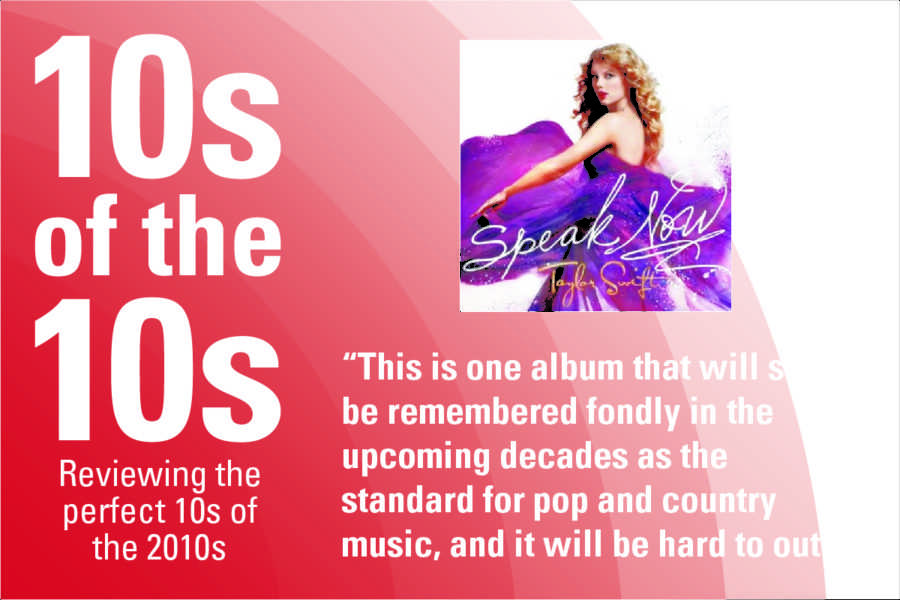10s of the 10s: Taylor Swift’s “Speak Now” speaks for itself
tay swift review templete
November 19, 2019
While many say Taylor Swift is simply a mainstream serial dater, it is hard to deny that her third album, “Speak Now,” is anything less than a defining album of the new decade.
Released Oct. 10, 2010, it set the bar high for the following albums of the generation while also beginning to signal Swift’s transition from the lovable country girl to a force-to-be-reckoned-with pop star.
This phase-change can be seen clearly when comparing the album’s sixth track “Mean” to its seventh track “Story of Us.” In “Mean,” there is a very prominent banjo throughout the accompaniment. This kind of instrumental has a strong correlation to many western genres of songs and movies. If the banjo isn’t evidence enough, Swift’s southern twang seems to be exaggerated at many points in the chorus with harmonies that are reminiscent of a church choir.
This shows a stark contrast when followed by “Story of Us.” Right away, the electric guitar is shredding, and her accent suddenly disappears. This song could easily be played on any pop station without the listener blinking an eye. Looking back just over nine years later, it’s clear to see this is when her evolution began.
“Mean” is more than just Swift holding on to her roots, however. It was written about a particularly rude critic who was tearing her apart. In fact, the whole album is a response to a different critic who claimed that Swift was incapable of writing music herself. To prove her musical capability, she wrote each song by herself — lyrics, music and all. As of today, “Speak Now” is still the only album where Swift was not assisted by any other songwriter.
Fans of Swift might have noticed by now that each album has a particular theme associated with the music. For example, “Fearless” is about having courage and “Red” is about passion and emotions. “Speak Now” is about speaking up and saying what needs to be said before it is too late.
“There is a time for silence,” Swift wrote in her prologue letter. “There is a time [for] waiting your turn. But if you know how you feel, and you clearly know what you need to say, you’ll know it. I don’t think you should wait, I think you should speak now.”
Each song was written as if it were a personal letter to a person or event, and it comes across as authentic and relatable. Listening back to this music as an adult, it clearly resonates more now than it had as a kid, dancing around with a hairbrush to “Mine.” Maybe it’s because Swift released this at 20 years old, the same age as many of us in college right now.
This is most clearly reflected in the eighth track, “Never Grow Up.” When writing this song, Swift had just moved into a new apartment and was living by herself. Her lyrics reflect on how the room was “much colder than [she] thought it would be,” even in July. Moving into a dorm or apartment away from your parents can be exciting for many, but to others, it can seem like an intimidating step into adulthood.
“Better than Revenge” is one of the most savage tracks within Swift’s entire repertoire. Compared to the more recent “Look What You Made Me Do” and “You Need to Calm Down,” it might not seem like much, but this song is borderline slanderous as it calls out her ex’s new girlfriend and her recreational habits. This song is rumored to be about Camilla Belle, who started dating Joe Jonas shortly after he broke his relationship off with Swift, resulting in a pool of bad blood between the two women. Many fans compare the style of this song to Paramore’s “Misery Business” in terms of content and instrumental ferocity.
“Dear John” is the longest track on the album and also one of the more emotionally confrontational. Swift might have a reputation for airing out her dirty love laundry through music, but this is one of the only times she mentioned the name of her ex within the actual song instead of in an interview or through fan speculation. The song clocks in at six minutes, 45 seconds, and questions the intentions of John, later identified as John Mayer. Of course, this is another example of when a song’s subject didn’t appreciate being publicly humiliated, but I don’t think that was Swift’s top priority during the songwriting process.
Another notable song is “Long Live.” This song isn’t written about one or two people. Instead, “Long Live” gives thanks to Swift’s fan base and band for supporting her throughout her career. Throughout the lyrics, Swift compares her reign of stardom to the reigns of noble royalty. She hopes that no matter how many haters bash on her music or how many years pass, her legacy will “still be remembered” by her devotees.
Being frank, each of the songs of the “Speak Now” album could have an entire article written about the music, lyrics, meaning and the effect they have on society, but that is exactly why it deserves to be in the top 10 albums of the decade. As a child and as an “adult” college student, these songs convey relationship struggles and meaningful sentiments that will always be relevant. This is one album that will still be remembered fondly in the upcoming decades as the standard for pop and country music, and it will be hard to outdo.







